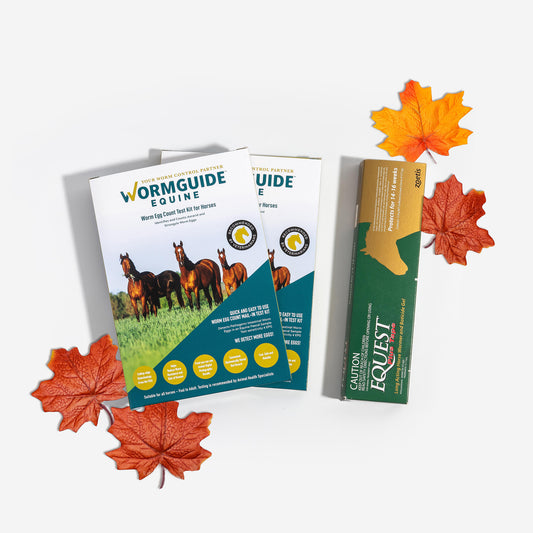
Understanding Senior Horse Worm Management
Considerations for seniors (>15 years) horses should generally follow the worm control recommendations given for mature horses.
But there are particular patterns and characteristics observed in senior horses to keep in mind.
The impact of stress can have a negative effect on your horse`s immunity. As a result, strongyle egg counts routinely increase in response to the multiple stressors that are common in senior horses. It doesn`t necessarily mean they have more worms but the female worms they have are able to lay more eggs. Thus, more eggs are released into the environment through the horse's manure.
Dangerous levels of infectivity result when horses with high egg counts spread worm eggs on pasture. And since the major objective of current worm control efforts is to prevent contamination of the environment, we can identify horses that require more de-worming treatments than others.

Primary Target: Focus on small strongyle worms
One aspect to think about with your senior horse is their immune response to their small strongyle worms. Senior horses have a tendency for higher eggs counts.
The link between increasing age and egg counts
A horse`s immunity can decline with age. It has been shown to interfere with the response to their strongyle worms.
Just because your senior horse is older doesn`t mean it is necessarily a high egg shedder. However, a decreasing immune function with advanced age effects the entire horse, including the ability to suppress their strongyle worms laying eggs.
Egg counts of your healthy, senior horse in good body condition should be monitored for positive increases with increasing age.
The link between Cushing’s Disease and egg counts
Cushing's disease is a common endocrine disease of middle-aged to senior horses and strongyle egg counts can increase in response to the horse's compromised immune function.
A 2010 study reported that horses with Cushing's had significantly higher strongyle egg counts than age-matched healthy horses.
A recent 2024 study conducted over the autumn-winter season in Australia was to determine if horses with Cushing disease( PPID syndrome) was associated with increased faecal egg counts following an effective ivermectin worming treatment.
The study reported two weeks after an ivermectin deworming treatment the egg counts knocked down to 0 EPG but researchers found the worms in some of the PPID horses started to lay eggs sooner. The egg reappearance period (ERP) was 56 days compared to control horses on day 70. This suggests a reduced ability to resist another worm infection. However, some PPID horses consistently had no detectable eggs or low EPG (≤ 200) throughout the study.
The researchers point out the immune dysfunction in horses with PPID could increase susceptibility to infectious diseases, including strongyle worm infections; however, few data are available.
This highlights the importance of regularly checking FECs, especially in senior horses with compromised immune systems
Meet Sunny
Sunny's story tells us just how valuable monitoring faecal egg counts (FECs) can be in looking after our golden oldie horses.

At 20 years old, Sunny has been diagnosed with Cushings Disease. Both age and this health issue appear to have affected his immunity to control the number of eggs each adult worm produces.
Read more about Sunny's story and what faecal egg counts told Dr Charlie here.
The link between health issues and egg counts
Although it is often assumed that senior horses need more de-worming treatments, any horse may begin to shed higher numbers of strongyle eggs if it experiences health issues. Dental problems or loses body condition happen to be more common in aged horses and egg counts can increase in response to these stressors.
Take-Home Message
These links highlight the importance of Surveillance Egg Count testing to monitor strongyle egg shedding status and identify if your senior horse requires more de-worming treatments beyond the one or two yearly baseline treatments.
Which de-wormer for small strongyle worms should I choose for my horse?
There are only 3 classes of de-worming drugs available. One thing to be aware of these days is de-wormer drug resistance.
There is documented resistance to all available drug classes.It is recommended to use the class with the highest observed efficacy and do a treatment check!
Benzimidazole and pyrantel resistance should both be assumed until proven otherwise with a treatment check.
This leaves the macrocyclic lactone class (ivermectin, moxidectin,abamectin) as the only option in many locations.
However, efficacy should be monitored once a year regardless of your chosen de-wormer because ever-increasing worming failures are documented in Australia and world-wide to all drug classes.
(Fingers crossed a new de-wormer medication is found).
How to do the de-wormer treatment check?
- A treatment check can be carried out for a single horse
- Some techniques will count more eggs than others.
- An egg counting technique that counts more eggs is required
.Find out if your de-wormer product still packs a punch!

Primary Target: Focus on Tapeworm
Another aspect to think about with your senior horse is tapeworm.
Did you know tapeworm is the only intestinal worm that horses don`t seem to develop any immunity?
Senior horses are at risk of harbouring tapeworm just like younger horses.
Tapeworms must be considered common in grazing horses. Horses that spend a lot of time on green pasture have a higher risk of acquiring tapeworm.
However, where horses that are not kept on green pastures, tapeworms are unlikely to require primary attention in worm control programs.
Cover your bases. Deworm all horses at a baseline rate once or twice a year.

Which de-wormer for tapeworm should I choose for my horse?
Praziquantel should be included for tapeworms at least once a year, if horses have access to green pastures. Tapeworm infections are difficult to diagnose using FECs as the eggs are intermittently shed from horses. One treatment during autumn/winter with praziquantel is generally sufficient in controlling tapeworm. Additional treatments for tapeworms should be given based on positive evidence of infection.
It should be recognised that in recent years findings have shown apparent treatment failure.
A study published in the International Journal of Parasitology: Drugs and Drug Resistance represents several observations made over the course of 2022 and the early part of 2023 of an apparent loss efficacy of praziquantel. This is deeply concerning and could be the first signs of another lurking de-wormer resistance crisis.
(Fingers crossed a new tapeworm medication is found)
Ascarid worms: Senior horses may have them
Ascarids are primarily a foal/yearling intestinal worm after which they protective immune response. Although rare, some older horses may have a deficient immune process that let`s the ascarid worms grow to become mature worms. If ascarids are present, re-infection will continue by picking up eggs from the pasture, feed or water, so removal of manure or disinfecting stables would help.
Which de-wormer for ascarid worms should I choose for my horse?
Be aware. Macrocyclic lactone (ivermectin. moxidectin, abamectin) resistance should be assumed until proven otherwise.
Both benzimidazoles and pyrantel pamoate usually are valid treatment options, however, the recommendation is to check 14 days after treatment to ensure these medications work.
What can you do for your senior horse today?
Due to the ever-increasing levels of de-wormer drug resistance in horse worms, the guidelines have changed to take a more surveillance-based approach, and it has become essential to keep track of which de-worming product still packs a punch for your horse. (Nobody wants to waste money on de-wormers that don`t work anymore).
More precision. More reliable.
Numerous techniques exist for determining faecal egg counts (FECs)
The faecal egg count (FEC) technique you choose plays a big role in helping you tailor a worm control strategy that meets the unique needs of your senior horse.
Make the simple shift to better precision FEC technology with WormGuide, and enjoy more reliable, more eggs counted, and more trustworthy egg count results.










